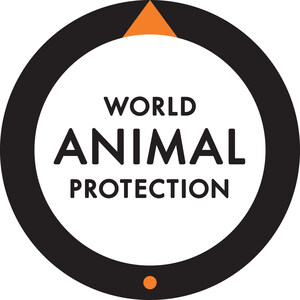World Animal Protection exposes the spread of cruel elephant rides
NEW YORK, Sept. 15, 2015 /PRNewswire-USNewswire/ -- The appalling cruelty inflicted upon Asian elephants used for tourist rides and shows is now spreading throughout southern Africa, reveals World Animal Protection in a report launching today (Tuesday, September 15).
The report highlights the rise in southern Africa of elephant rides and shows, tourist attractions that are already well established in parts of Asia.
Elephant rides are a popular and lucrative tourist activity, but behind the scenes, the animals are taken from their mothers, their spirits are broken, and they endure cruel and stressful 'training' to make them tolerate being ridden. If not addressed urgently, hundreds more African elephants could face a lifetime of cruel confinement, beatings and other harsh treatment, all for tourist entertainment.
The current situation in Africa:
- The first tourist elephant rides at parks in Africa started in the late 1990s and began spreading throughout South Africa in 2001
- Most commercial elephant parks are in South Africa, where at least 144 captive elephants are held in at least 28 different venues (Based on 2015 data from World Animal Protection research and the NSPCA[i])
- A further 47 elephants are held in seven elephant parks across Zimbabwe, 13 in two venues in Zambia, and 11 in two venues in Botswana.
- 24 young elephants were recently sold and exported by the Zimbabwean government to Chimelong Safari Park in China[ii]. They will suffer a life of abuse performing in shows and giving rides.
The numbers of wild elephants in southern Africa have increased since the beginning of the 20th century. However, the poaching of elephants to meet the growing tourist demand, in addition to poaching for ivory, could put them under more strain.
Kate Nustedt, Director of Wildlife at World Animal Protection, says: "You're taking the wild out of Africa by breaking the spirit of their elephants so they can be ridden and perform for tourists. People who love animals will be shocked about the cruelty behind the scenes of elephant rides, and they will no longer want to take part. There are many places in southern Africa for tourists to see elephants in the wild, and we're encouraging people to see them there, not in cruel tourist entertainment."
"We're working with the industry to end cruel wildlife tourism," continues Nustedt. "As a result of our work so far, over 20 travel companies around the world, including TUI Nederland, Intrepid Travel, Apollo, Albatros Travel and World Expeditions, have stopped offering and promoting elephant rides or shows to their customers. We're calling on all operators to do the same – and to show their commitment to this by signing the World Animal Protection Elephant-friendly Tourism Pledge."
Note to editors
- World Animal Protection is building a global movement to put wildlife protection on the agenda and reduce the tourist demand for cruel animal entertainment attractions. Find out more here: http://www.worldanimalprotection.us.org/wildlife-not-entertainers
- There are currently no known commercial elephant parks operating in Angola, Malawi or Mozambique and no elephant riding venues in Central, Eastern and West Africa regions. But the absence of them cannot be guaranteed if tourist pressure for rides continues to increase.
[i] Wentzel I, A. Hay (2015). The welfare status of elephants in captivity in South Africa. Wildlife Protection Unit, National Council of SPCAs of South Africa, Johannesburg, South Africa. 32 pp
[ii] Sieff, K (2015). Zimbabweans Alarmed By Deal That Could See Hundreds of Elephants Shipped To China. National Post. August 26th 2015 [ONLINE]. Available at: http://news.nationalpost.com/news/world/deal-that-could-see-hundreds-of-elephants-shipped-to-china-worries-zimbabweans [Accessed 3rd September 2015].
SOURCE World Animal Protection
Related Links
http://www.worldanimalprotection.us.org
WANT YOUR COMPANY'S NEWS FEATURED ON PRNEWSWIRE.COM?
Newsrooms &
Influencers
Digital Media
Outlets
Journalists
Opted In





Share this article